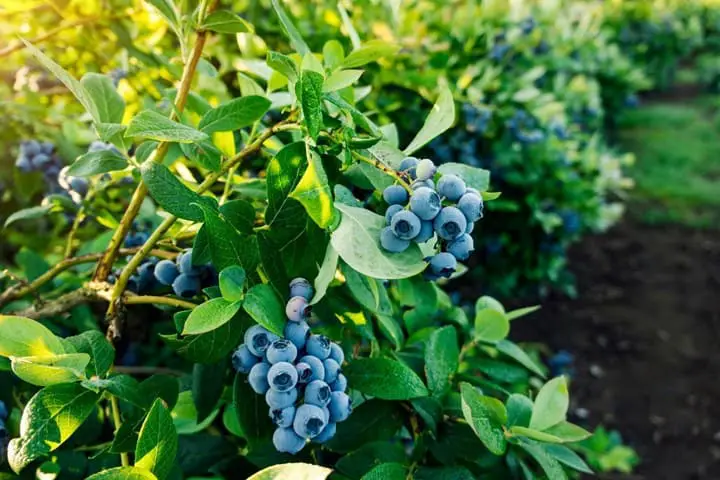Introduction
Enhance your blueberry gardening experience by incorporating companion plants that not only support the growth of your blueberries but also contribute to a thriving ecosystem. From enhancing soil quality to deterring pests and attracting beneficial pollinators, the right companions can make a significant difference in your blueberry harvest. Let’s delve into the world of blueberry companion plants and unlock the secrets to a flourishing garden.
Understanding Blueberry Companion Plants
In your journey to cultivate vibrant blueberry bushes, understanding the concept of companion planting is essential. Blueberry companion plants are species strategically chosen to grow alongside blueberries, offering mutual benefits such as improved soil health, pest control, and pollination support.
Blueberries thrive in acidic soil with good drainage, making them compatible with several plant species that share similar soil preferences and growth conditions. By selecting the right companions, you can create a harmonious ecosystem that maximizes the potential of your blueberry bushes.
Creating a Diverse Ecosystem
Diversity is key to a healthy garden ecosystem. Integrate a variety of blueberry companion plants to attract beneficial insects, deter pests, and enhance nutrient cycling. Embrace the beauty of biodiversity and foster a dynamic environment where each plant contributes to the overall well-being of the garden.
Beneficial Blueberry Companion Plants
Discover a selection of blueberry companion plants renowned for their ability to thrive alongside blueberries while offering valuable benefits:
- 1. Rhododendrons and Azaleas
- 2. Ferns
- 3. Lupines
- 4. Cranberries
- 5. Highbush Cranberries
- 6. Lingonberries
- 7. Blackberries and Raspberries
- 8. Daffodils
- 9. Marigolds
- 10. Mint
- 11. Thyme
- 12. Chives
- 13. Strawberries
Optimizing Soil Health
Healthy soil is the foundation of a thriving garden. Certain companion plants, such as nitrogen-fixing legumes and dynamic accumulators, play a crucial role in enriching the soil and providing essential nutrients for blueberry growth.
Nitrogen-Fixing Legumes
Leguminous plants, including clover and beans, have the remarkable ability to convert atmospheric nitrogen into a form that can be absorbed by plants, enriching the soil with this vital nutrient. Intercropping blueberries with nitrogen-fixing legumes promotes healthy growth and reduces the need for synthetic fertilizers.
Natural Pest Control
Combat common pests and minimize the need for chemical pesticides by strategically incorporating pest-repellent companion plants into your blueberry garden. Certain aromatic herbs and flowers emit scents that deter pests, creating a natural barrier to protect your blueberry bushes.
Pest-Repellent Plants
Harness the power of nature to ward off pests with the following companion plants:
- 1. Lavender
- 2. Rosemary
- 3. Sage
- 4. Nasturtiums
- 5. Garlic
- 6. Onions
Attracting Pollinators
Pollinators play a vital role in blueberry production by facilitating the transfer of pollen between flowers, leading to fruit development. Encourage pollinator activity in your garden by incorporating plants that attract bees, butterflies, and other beneficial insects.
Pollinator-Friendly Plants
Create a welcoming habitat for pollinators with the following companion plants:
- 1. Lavender
- 2. Bee Balm
- 3. Echinacea
- 4. Sunflowers
- 5. Butterfly Bush
- 6. Aster
FAQs (Frequently Asked Questions)
How do I prepare the soil for planting blueberries? To prepare the soil for blueberries, ensure it is acidic with a pH level between 4.5 and 5.5. Incorporate organic matter such as peat moss or compost to improve soil structure and fertility.
When is the best time to plant blueberry companion plants? The ideal time to plant blueberry companion plants is in early spring or fall when the weather is cool and moist. This allows the plants to establish their root systems before the onset of harsh conditions.
Can I grow blueberries in containers with companion plants? Yes, blueberries can be grown in containers alongside compatible companion plants. Choose large containers with adequate drainage and select companion plants that thrive in container gardens.
How do I protect blueberries from birds and other wildlife? To protect blueberries from birds and wildlife, consider using bird netting, scare tactics, or physical barriers such as fencing. Additionally, planting companion plants with strong aromas or thorny foliage can help deter pests.
Are there any plants that should not be planted near blueberries? Avoid planting plants that require alkaline soil or have aggressive root systems near blueberries. Additionally, steer clear of plants that are susceptible to the same pests and diseases as blueberries.
What are some edible blueberry companion plants? Several blueberry companion plants, such as strawberries, herbs, and certain fruits, are not only beneficial to blueberries but also edible for human consumption. Explore a diverse range of companion plants that offer both aesthetic appeal and culinary value.
Conclusion
Elevate your blueberry gardening experience by incorporating companion plants that complement and enhance the growth of your blueberry bushes. From optimizing soil health to attracting pollinators and deterring pests, the right companions can unlock the full potential of your garden. Embrace biodiversity, foster a thriving ecosystem, and enjoy a bountiful harvest of delicious blueberries year after year.


